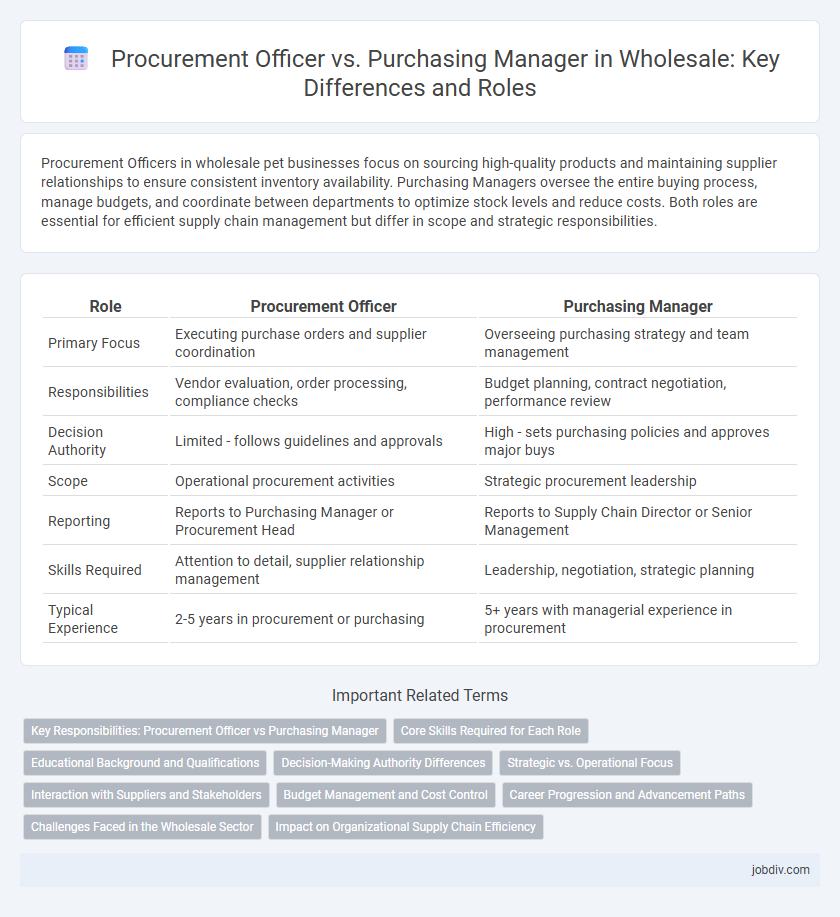Procurement Officers in wholesale pet businesses focus on sourcing high-quality products and maintaining supplier relationships to ensure consistent inventory availability. Purchasing Managers oversee the entire buying process, manage budgets, and coordinate between departments to optimize stock levels and reduce costs. Both roles are essential for efficient supply chain management but differ in scope and strategic responsibilities.
Table of Comparison
| Role | Procurement Officer | Purchasing Manager |
|---|---|---|
| Primary Focus | Executing purchase orders and supplier coordination | Overseeing purchasing strategy and team management |
| Responsibilities | Vendor evaluation, order processing, compliance checks | Budget planning, contract negotiation, performance review |
| Decision Authority | Limited - follows guidelines and approvals | High - sets purchasing policies and approves major buys |
| Scope | Operational procurement activities | Strategic procurement leadership |
| Reporting | Reports to Purchasing Manager or Procurement Head | Reports to Supply Chain Director or Senior Management |
| Skills Required | Attention to detail, supplier relationship management | Leadership, negotiation, strategic planning |
| Typical Experience | 2-5 years in procurement or purchasing | 5+ years with managerial experience in procurement |
Key Responsibilities: Procurement Officer vs Purchasing Manager
Procurement Officers specialize in sourcing suppliers, evaluating bids, and negotiating contracts to ensure cost-effective and timely acquisition of goods. Purchasing Managers oversee the entire procurement process, manage supplier relationships, and coordinate with internal departments to align purchasing strategies with business goals. Both roles require strong negotiation skills and market analysis but differ in scope, with Purchasing Managers handling broader strategic planning and team supervision.
Core Skills Required for Each Role
Procurement Officers excel in strategic sourcing, vendor negotiation, and contract management, ensuring cost-effective acquisition of goods and services. Purchasing Managers prioritize team leadership, inventory control, and supplier relationship management to streamline procurement processes and maintain supply chain efficiency. Both roles require strong analytical skills, attention to detail, and proficiency in procurement software to optimize wholesale operations.
Educational Background and Qualifications
Procurement Officers typically hold a bachelor's degree in supply chain management, business administration, or a related field, emphasizing foundational knowledge in sourcing and vendor relations. Purchasing Managers often possess advanced qualifications, such as a master's degree or professional certifications like CPSM (Certified Professional in Supply Management), demonstrating expertise in strategic procurement and leadership. Both roles require strong analytical skills, but Purchasing Managers generally have more extensive experience and a broader educational background to manage complex purchasing operations.
Decision-Making Authority Differences
Procurement Officers typically focus on executing purchasing decisions within established guidelines, possessing limited decision-making authority primarily related to vendor selection and order approval. Purchasing Managers hold broader decision-making power, including strategic planning, budget allocation, contract negotiations, and supplier relationship management. The key difference lies in the Purchasing Manager's role in setting procurement policies and making high-level decisions that influence overall supply chain efficiency.
Strategic vs. Operational Focus
Procurement Officers primarily emphasize strategic sourcing, supplier relationship management, and long-term cost reduction initiatives critical in wholesale supply chain optimization. Purchasing Managers focus on operational execution, managing day-to-day purchasing activities, order processing, and inventory control to ensure seamless product availability. Effective wholesale procurement relies on aligning strategic procurement plans led by Procurement Officers with the operational efficiency driven by Purchasing Managers.
Interaction with Suppliers and Stakeholders
Procurement Officers primarily focus on supplier relationship management, ensuring timely communication and negotiation to secure favorable terms. Purchasing Managers coordinate with internal stakeholders to align procurement strategies with organizational goals while overseeing supplier performance metrics. Effective interaction between these roles enhances supply chain efficiency and supports strategic sourcing initiatives in wholesale operations.
Budget Management and Cost Control
Procurement Officers focus on executing purchasing activities within established budgets, ensuring compliance with financial guidelines while negotiating favorable terms to control costs. Purchasing Managers oversee the entire budget management process, analyzing spending patterns and implementing strategic sourcing initiatives to optimize expenses and maximize savings. Both roles contribute to cost control, but Purchasing Managers hold greater responsibility for budget planning and financial decision-making in wholesale operations.
Career Progression and Advancement Paths
Procurement Officers typically handle supplier evaluations and order processing, serving as a foundation for understanding supply chain operations. Purchasing Managers build on this experience by overseeing strategic sourcing, managing vendor relationships, and leading procurement teams, which positions them for higher roles such as Procurement Directors. Career progression often involves gaining skills in contract negotiation, budget management, and data analysis to advance from operational roles to strategic leadership within wholesale organizations.
Challenges Faced in the Wholesale Sector
Procurement Officers face the challenge of maintaining accurate supplier data and ensuring compliance with complex regulatory requirements in the wholesale sector. Purchasing Managers struggle with demand forecasting, cost control, and negotiating bulk contracts to optimize profit margins and inventory turnover. Both roles must adapt rapidly to market fluctuations and supply chain disruptions to sustain operational efficiency.
Impact on Organizational Supply Chain Efficiency
Procurement Officers ensure cost-effective sourcing by negotiating supplier contracts and maintaining vendor relationships, directly reducing supply chain delays and inventory costs. Purchasing Managers oversee procurement strategies and coordinate purchasing activities, enhancing supply stability and aligning procurement goals with organizational efficiency. Together, their roles optimize supply chain performance, minimizing disruptions and improving overall operational productivity in wholesale businesses.
Procurement Officer vs Purchasing Manager Infographic

 jobdiv.com
jobdiv.com